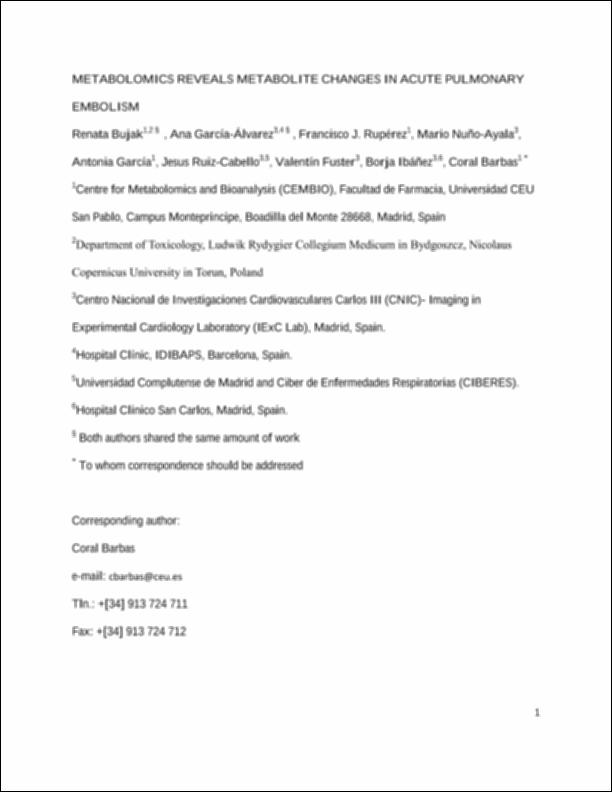Por favor, use este identificador para citar o enlazar este ítem:
http://hdl.handle.net/10637/7664Metabolomics reveals metabolite changes in acute pulmonary embolism .
| Título : | Metabolomics reveals metabolite changes in acute pulmonary embolism . |
| Autor : | Bujak, Renata García Álvarez, Ana Rupérez Pascualena, Francisco Javier Nuño Ayala, Mario García Fernández, Antonia Ruiz Cabello, Jesús Ibáñez, Borja Barbas Arribas, Coral. |
| Materias: | Metabolitos.; Metabolomics; Metabolic fingerprinting; Pulmonary embolism; Pulmonary hypertension; Pic |
| Resumen : | Pulmonary embolism (PE) is a common cardiovascular emergency which can lead to pulmonary hypertension (PH) and right ventricular failure as a consequence of pulmonary arterial bed occlusion. The diagnosis of PE is challenging due to non-specific clinical presentation what results in relatively high mortality. Moreover, the pathological factors associated with PE are poorly understood. Metabolomics can provide with new highlights which can help in the understanding of the processes and even propose biomarkers for its diagnosis. In order to obtain more information about PE and PH, acute PE was induced in large white pigs and plasma was obtained before and after induction of PE. Metabolic fingerprints from plasma were obtained with LC-QTOF-MS (positive and negative ionization) and GC-Q-MS. Data pretreatment and statistical analysis (uni- and multivariate) was performed in order to compare metabolic fingerprints and to select the metabolites that showed higher loading for the classification (28 from LC and 19 from GC). The metabolites found differentially distributed among groups are mainly related to energy imbalance in hypoxic conditions, such as glycolysis-derived metabolites, ketone bodies, and TCA cycle intermediates, as well as a group of lipidic mediators that could be involved in the transduction of the signals to the cells such as sphingolipids and lysophospholipids, among others. Results presented in this report reveal that combination of LC−MS- and GC−MS-based metabolomics could be a powerful tool for diagnosis and understanding pathophysiological processes due to acute PE. |
| Descripción : | Artículo en colaboración con : Renata Bujak , Ana García-Álvarez, Francisco J. Rupérez, Mario Nuño-Ayala, Antonia García, Jesus Ruiz-Cabello, Valentín Fuster, Borja Ibáñez En: Journal of Proteome Research. ESSN. 1535-3907. 2014, 11:518-528, doi: 10.1021/pr400872j |
| URI : | http://hdl.handle.net/10637/7664 |
| Derechos: | http://creativecommons.org/licenses/by-nc-nd/4.0/deed.es |
| Fecha de publicación : | 16-sep-2014 |
| Centro : | Universidad San Pablo-CEU |
| Aparece en las colecciones: | Facultad de Farmacia |
Los ítems de DSpace están protegidos por copyright, con todos los derechos reservados, a menos que se indique lo contrario.


